Stacker dug through the annals of rock music history and highlighted 20 one-hit wonders who only had one single that reached gold or platinum status.
– Gie Knaeps // Getty Images
Katrina Sirotta
The term “one-hit wonder” is often perceived negatively—like the act was a flash in the pan or reaped the benefits of a popular fad or a film or television sync—but most musicians would give anything to have just one hit.
Stacker dug through the annals of rock music history and highlighted 20 one-hit wonders, identified by rock artists whose only single reached gold or platinum status from the Recording Industry Association of America.
Achieving such a feat really is lightning in a bottle. To put things into perspective, for a single to be certified gold by the RIAA, it has to sell the equivalent of at least 500,000 copies. For platinum, that number springs up to 1 million, and the tiers of multiplatinum go up by 1 million (for example, an 8x platinum single would have sold 8 million copies).
Albeit instantly familiar, artists like Smash Mouth and Twisted Sister are among the more shocking one-hit wonders on this list, whereas others are less so because their hits exceed their popularity. There’s even an entry that had to create a fictitious band when its single became a hit because the musicians involved refused to associate their names with the song.
Read on to learn more about the one-hit wonders every rock music fan will remember.
You may also like: 10 popular ’90s artists going on tour in 2024

Scott Dudelson // Getty Images
Blues Image
“Ride Captain Ride” is Blues Image’s biggest hit, and singer Mike Pinera wrote it on the spot when the band needed one more song to complete their sophomore album, “Open.” The blues-rock classic soared up the Billboard Hot 100 chart and peaked at #4 on July 18, 1970. It was certified gold on Aug. 4 of the same year. Blues Image disbanded shortly after the album’s release, with Pinera joining Iron Butterfly and keyboardist Skip Konte joining Three Dog Night.

Scott Gries // Getty Images
The Darkness
When the Darkness released “I Believe in a Thing Called Love” in 2003, it looked like an ’80s glam rock revival was underway. The song’s electrifying guitar riff, frontman Justin Hawkins’ falsetto, and the catchy chorus make it a karaoke jam. A full genre revival never came, and the Darkness has had its ups and downs since then, but the song is still so beloved that it was certified platinum on Oct. 5, 2023.
(Fun fact: In 2023, guitarist Dan Hawkins admitted the band was attempting to “write the stupidest song ever” when they penned “I Believe in a Thing Called Love.”)

Siemoneit/ullstein bild via Getty Images
Eddy Grant
Eddy Grant had already enjoyed two decades of success in the U.K. as a solo artist and with his group, the Equals, when he released “Electric Avenue” in 1983. The Guyanese British singer-songwriter is known for thoughtfully blending reggae, British rock, funk, and soul sounds, and his political anthem caught on big time in the U.S. “Electric Avenue” peaked at #2 on the Billboard Hot 100 chart and was certified platinum on Dec. 20, 1989. Grant is still an active musician; however, he hasn’t been able to achieve another big hit.
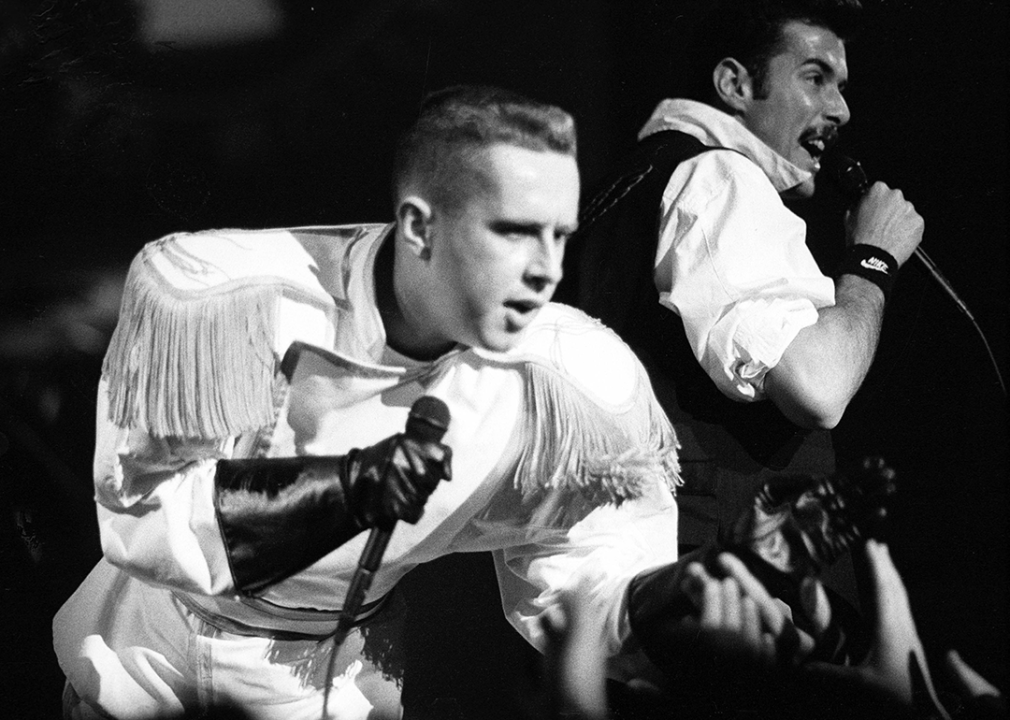
Ian Dickson/Redferns // Getty Images
Frankie Goes to Hollywood
Frankie Goes to Hollywood hit the ground running with their debut single, “Relax.” The 1983 synth-pop track was a club remix hit, and its “obscene” content warranted a ban from BBC, which garnered them even more publicity. “Relax” topped the charts in the U.K. and reached #10 on the Billboard Hot 100. On Jan. 17, 1989, the single reached gold status. The band continued to succeed in Europe but never had another hit in the U.S.

Gary Wolstenholme/Redferns via Getty Images
Gotye
Most musicians begin their careers with the hope of making it big. For Gotye (real name Wouter De Backer), this was not the case. The Belgium-born, Australia-raised singer-songwriter never sought stardom, and when his 2011 single “Somebody That I Used to Know” became a worldwide hit, it was too much for him. Gotye won three Grammys in 2013, and the son—featuring New Zealand singer Kimbra—was certified 14x platinum in 2021. However, he informed fans via newsletter in 2014 that “there will be no new Gotye music.”
You may also like: One-hit wonders of hip-hop
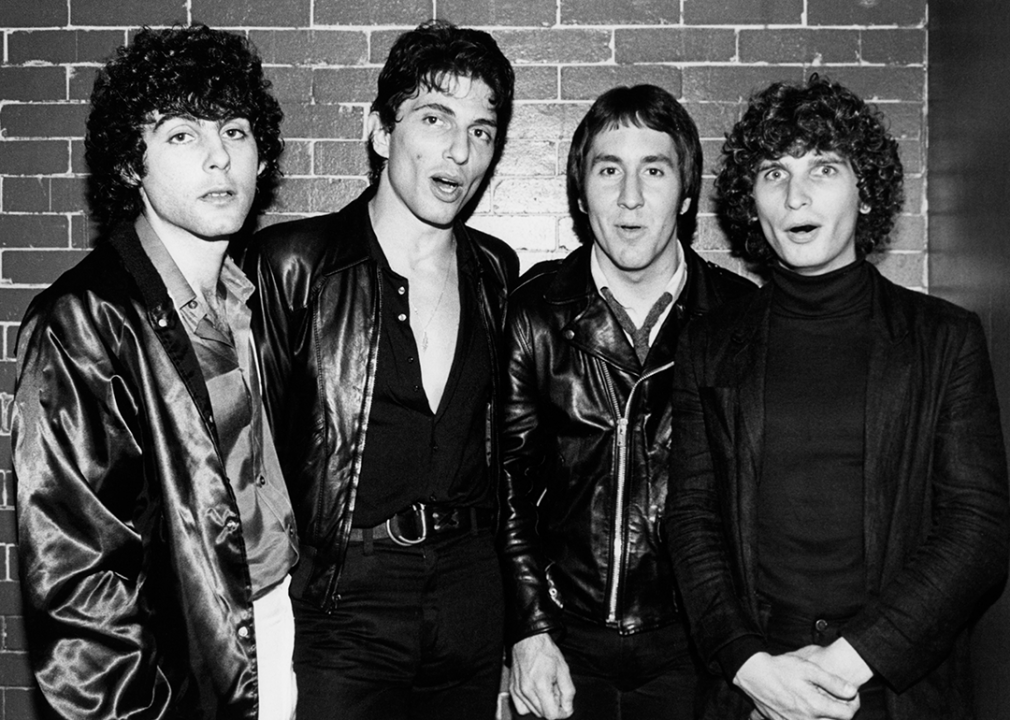
Ebet Roberts/Redferns // Getty Images
The Knack
The Knack may be a one-hit wonder, but their one hit sure made an impact! When the band released their debut single, “My Sharona,” in 1979, it became Capitol Records’ fastest to be certified gold since the Beatles’ “I Want to Hold Your Hand.” The instant classic was not only the biggest song of the year; it was the biggest song of the decade. It’s also been credited with killing disco and beginning the New Wave craze. The Knack couldn’t replicate the success of “My Sharona” and broke up a few years later.
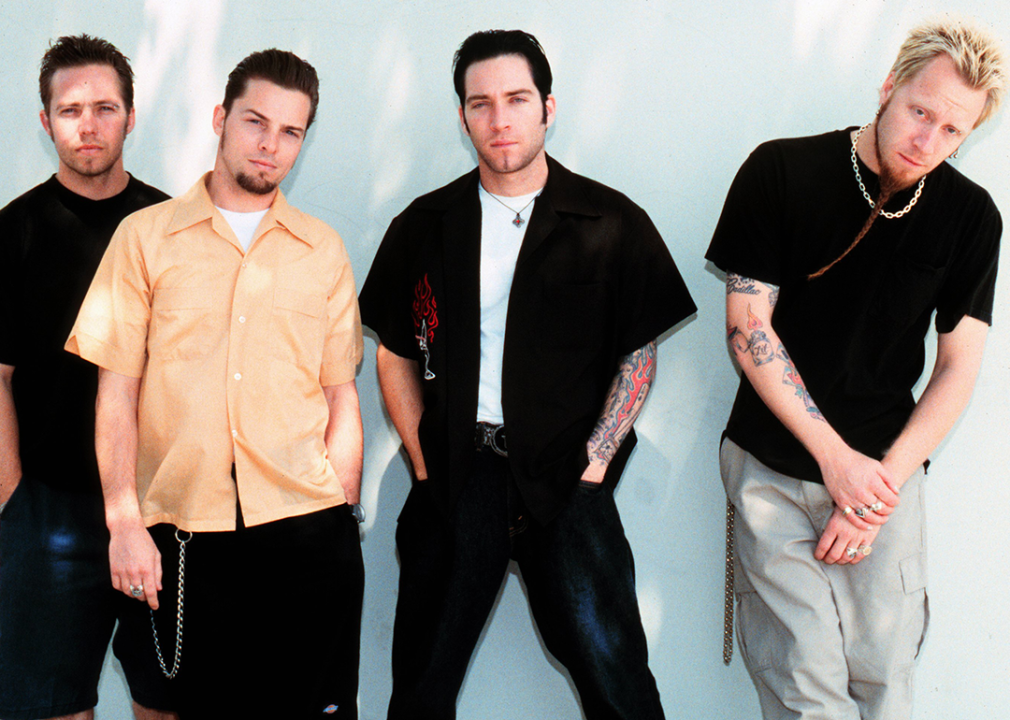
Jim Steinfeldt/Michael Ochs Archives // Getty Images
Lit
The late ’90s saw a boom in pop-punk popularity, and Lit was a major name in the post-grunge landscape. Their 1999 sophomore album, “A Place in the Sun,” saw the band take a poppier approach to their music, and it was anchored by the lead single, “My Own Worst Enemy.” The song about a debaucherous night of drinking is still as relatable as ever and went double platinum in 2020. Lit hasn’t had another hit, but they’re still going strong, making music and touring.

Bernd Muller/Redferns // Getty Images
Meredith Brooks
Meredith Brooks’ 1997 single “B—h” went gold, spent four weeks at #2 on the Billboard Hot 100 chart, and was nominated for two Grammys—but Capitol Records almost didn’t let her release it because label executives were weary about the derogatory title. The song became a feminist anthem, with women reclaiming the word, which is generally used as an insult. Brooks released her last album in 2007 but still works in the music industry as a record producer.
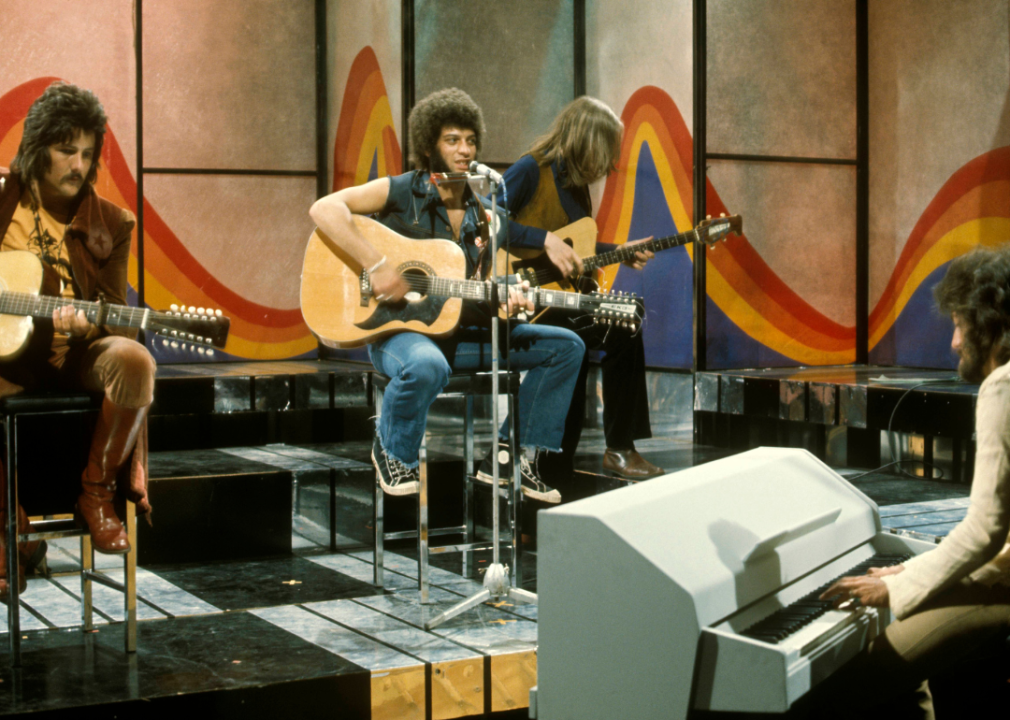
Tony Russell/Redferns // Getty Images
Mungo Jerry
Mungo Jerry became an overnight success when they released their 1970 debut single, “In the Summertime.” The song’s playful nature and carefree approach to blues music helped it reach #3 on the Billboard Hot 100 chart and receive gold certification before the summer’s end. The band never reached that kind of success in the U.S. again; however, frontman Ray Dorset has continued to record and tour under the Mungo Jerry moniker.
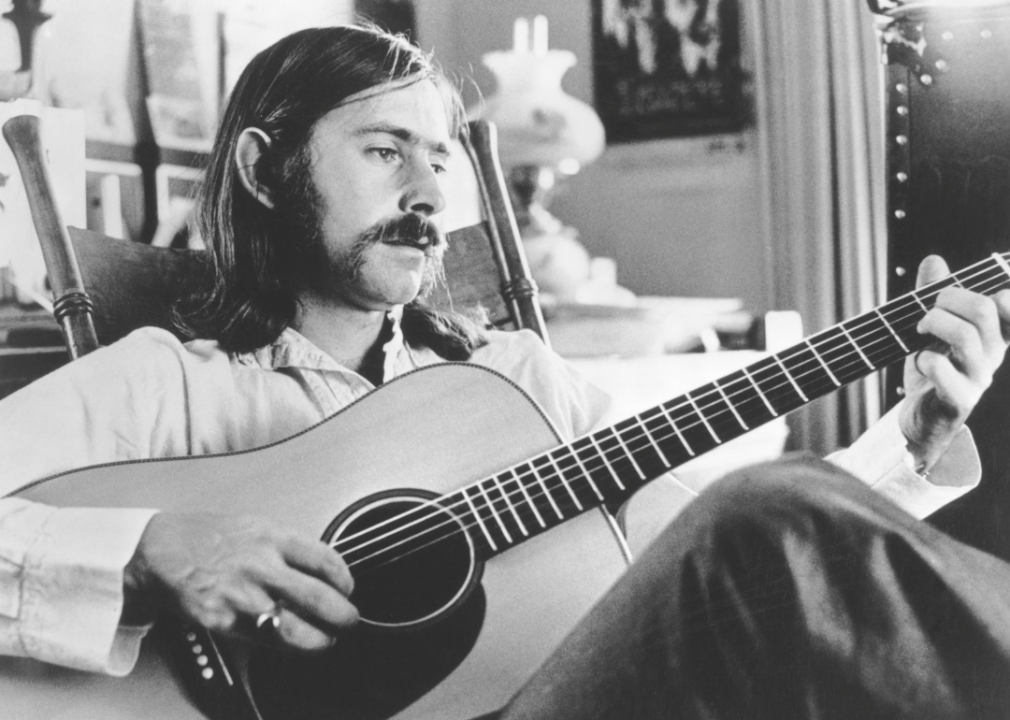
GAB Archive/Redferns // Getty Images
Norman Greenbaum
If you know “Spirit in the Sky,” chances are you heard it in a movie—it’s been featured on more than 100 soundtracks—but it almost sounded completely different. Norman Greenbaum originally wrote it as a folk song, but producer Erik Jacobsen helped him turn it into the instantly recognizable psych-rock classic it’s known for today. The song’s still popular thanks to syncs; however, its appeal came instantly. It was certified gold on April 23, 1970, just a few months after its U.S. release.
You may also like: 25 hip-hop pioneers: Then and now

Ebet Roberts/Redferns // Getty Images
The Proclaimers
The Proclaimers released “I’m Gonna Be (500 Miles)” in 1988, but it wasn’t until 1993 that it became a hit in America. The song was synched in the iconic romantic comedy “Benny & Joon” and blew up, peaking at #3 on the Billboard Hot 100 chart, and was certified gold on Aug. 2, 1993. In a 2015 interview, singer-songwriter Craig Reid divulged that the duo earns five times as much money on that one song than they do on the rest of their discography combined, but he doesn’t view it as a bad thing. It enables them to continue recording and touring.
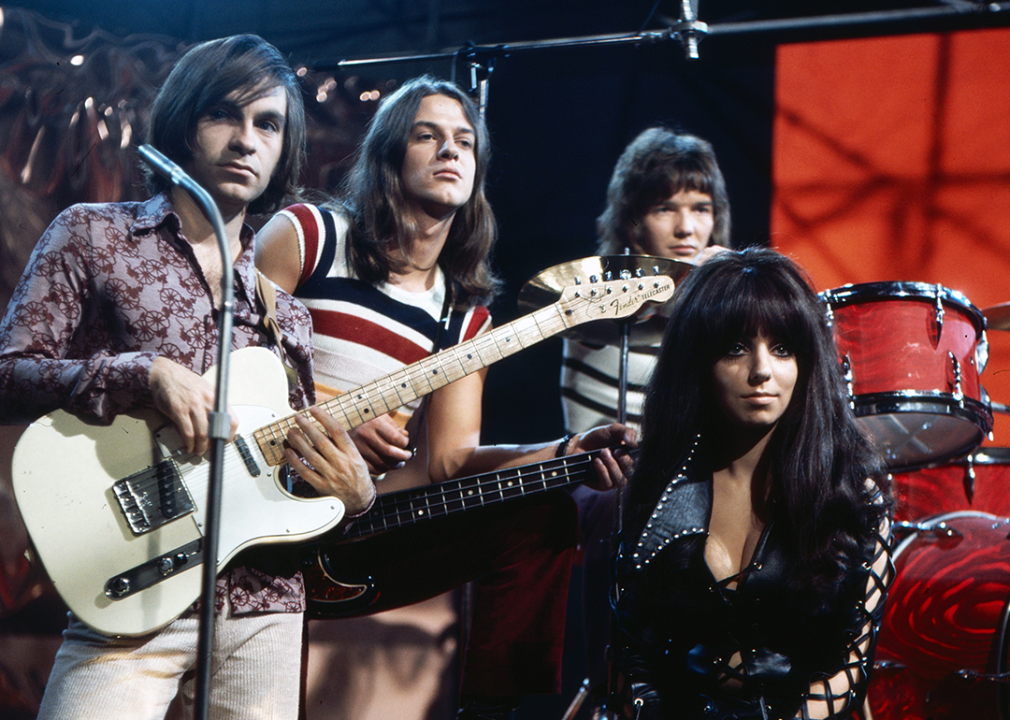
Arthur Grimm/United Archives via Getty Images
Shocking Blue
When Shocking Blue’s 1969 single “Venus” reached #1 on the Billboard Hot 100 chart, it was historic. The psych rockers were the first Dutch band to top the U.S. chart. The song was a monster hit worldwide, selling more than 5 million copies internationally, and went gold on Jan. 28, 1970. Shocking Blue ended up disbanding in 1974, but the song outlived the group. In 1986, Bananarama covered “Venus”—and with chart-topping results. In 2001, the song’s popularity was revived when it was used for a famous Gillette commercial promoting its Venus razors.
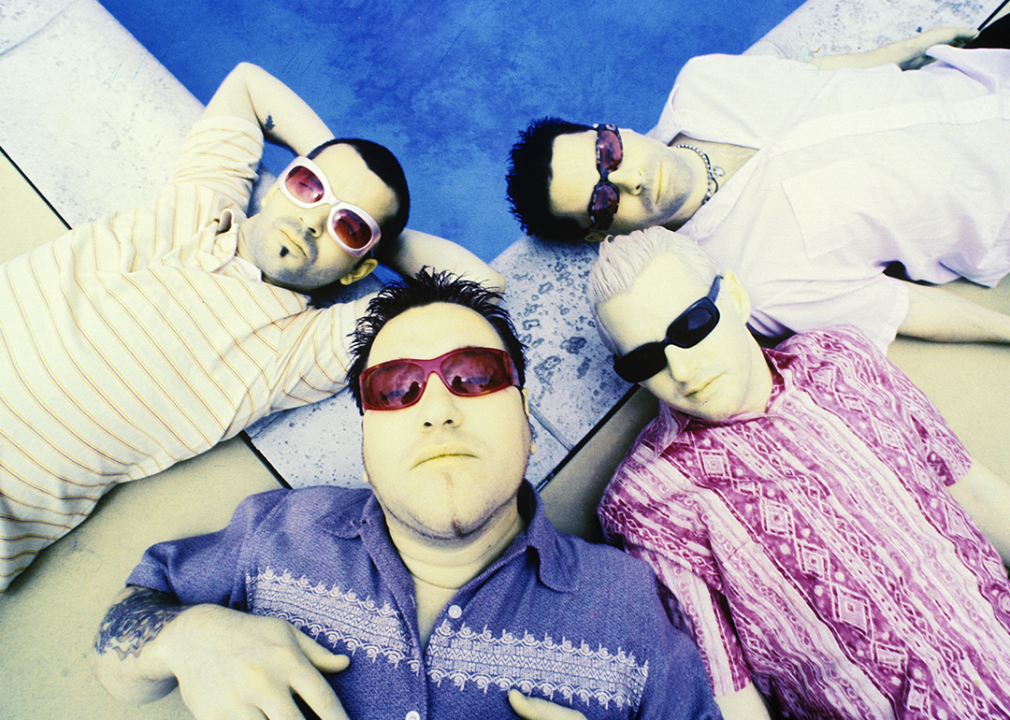
Bob Berg // Getty Images
Smash Mouth
Some may argue that Smash Mouth isn’t a one-hit wonder—their chart-topping single “Walkin’ on the Sun” was everywhere in 1997—however, “All Star” is the band’s only song to reach gold or platinum status (it went triple platinum in 2020). The song spent nine weeks atop the charts in 1999 and then received a major resurgence when it was used in the opening sequence of the 2001 movie “Shrek.” (The soundtrack sold roughly 2.5 million copies.) Smash Mouth couldn’t duplicate the success of “All Star,” and singer Steve Harwell left the band in 2021. Sadly, he passed away from acute liver failure two years later.
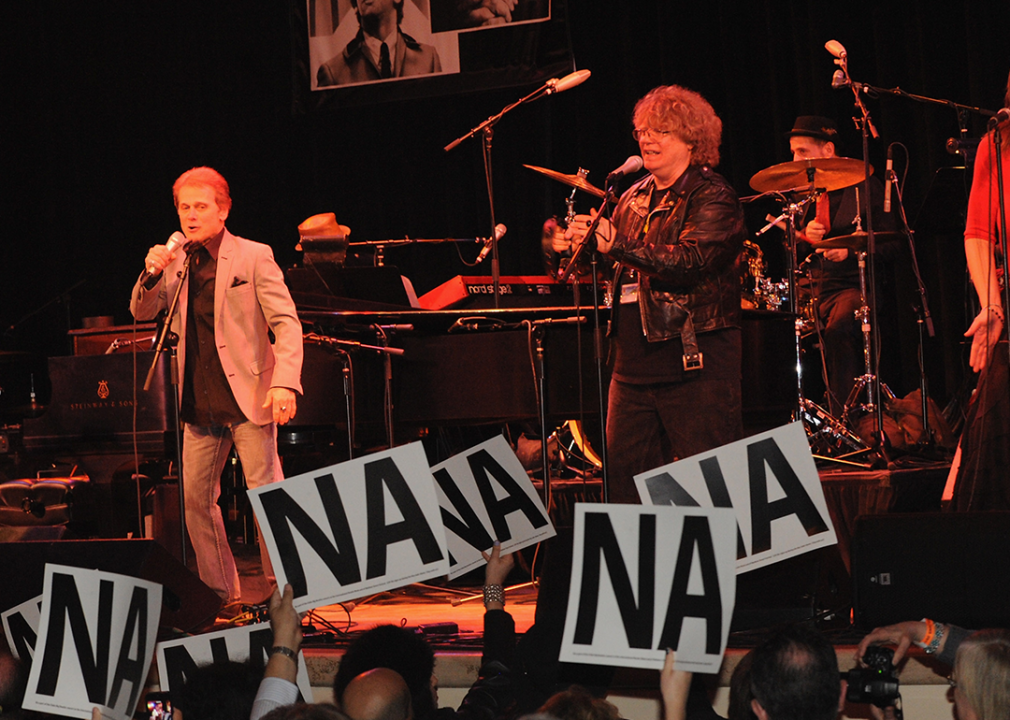
Bobby Bank/WireImage // Getty Images
Steam
If you’ve been to a sporting event where a player or coach gets ejected or a team suffers a brutal loss, chances are you’ve heard “Na Na Hey Hey Kiss Him Goodbye.” The song is the ultimate taunt in arenas and stadiums, and its origin story is pretty interesting.
The song was recorded by studio musicians Gary DeCarlo, Dale Frashuer, and Paul Leka in 1969. It was supposed to be used as a B-side to DeCarlo’s next single; however, Mercury Records loved it so much they insisted it stand on its own. The trio refused to put their names on the song, so it was released under the fictitious band Steam.
“Na Na Hey Hey Kiss Him Goodbye” ended up topping the Billboard Hot 100 chart and was certified gold at the end of 1969. Steam was expected to tour after the single hit #1, but the band didn’t exist. Leka ended up curating a touring band that didn’t feature any of the musicians who actually wrote and recorded the song.
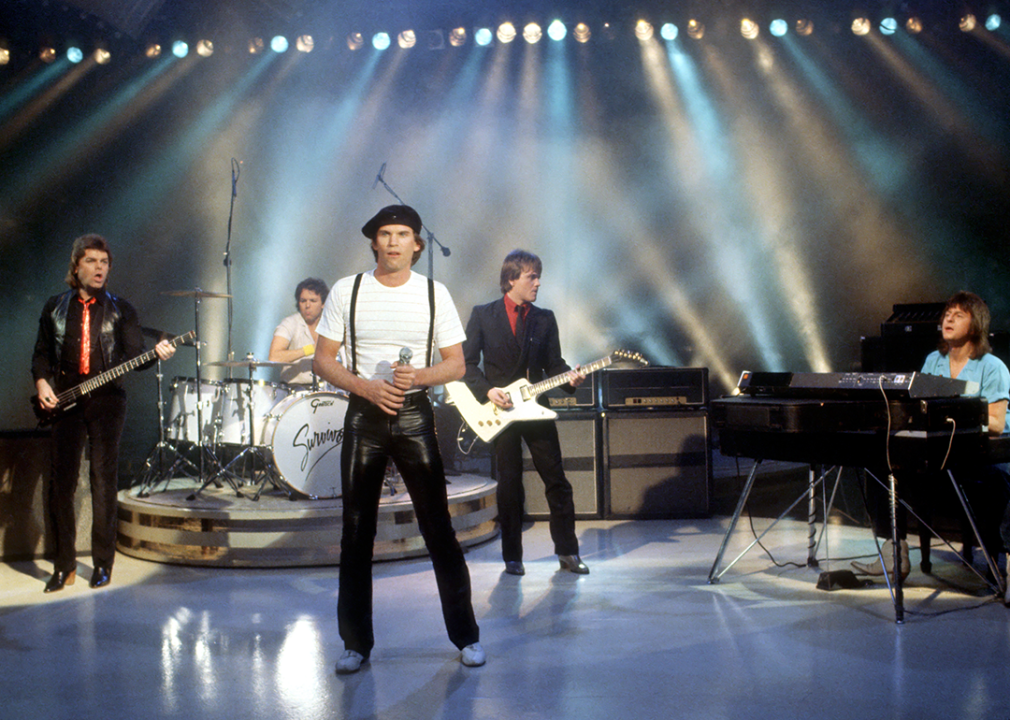
Ron Wolfson/Michael Ochs Archives // Getty Images
Survivor
Survivor’s “Eye of the Tiger” is synonymous with the “Rocky” film franchise after being used for an iconic montage in “Rocky III.” The sync resulted in a Grammy, an Academy Award nomination, and six weeks on top of the charts for Survivor—not to mention three different song versions receiving gold and platinum certification from the RIAA. Still, the track wasn’t even supposed to be in the film. Actor-director Sylvester Stallone wanted Queen’s “Another One Bites the Dust” to soundtrack the legendary scene, but Queen refused permission.
You may also like: 20 iconic rock songs written on the spot

John Atashian // Getty Images
Tommy Tutone
When Tommy Tutone released “867-5309/Jenny” in 1981, it was said to be about an actual woman’s phone number scrawled on a bathroom wall. It wasn’t until 2004 that co-writer Alex Call debunked the myth and confessed Jenny and her story were fictional. No matter the actual inspiration, the song was a hit and peaked at #4 on the Billboard Hot 100 chart. It was certified gold in 1991. Tommy Tutone never recorded another hit, but that didn’t stop them from making music. In fact, they’re still an active band.
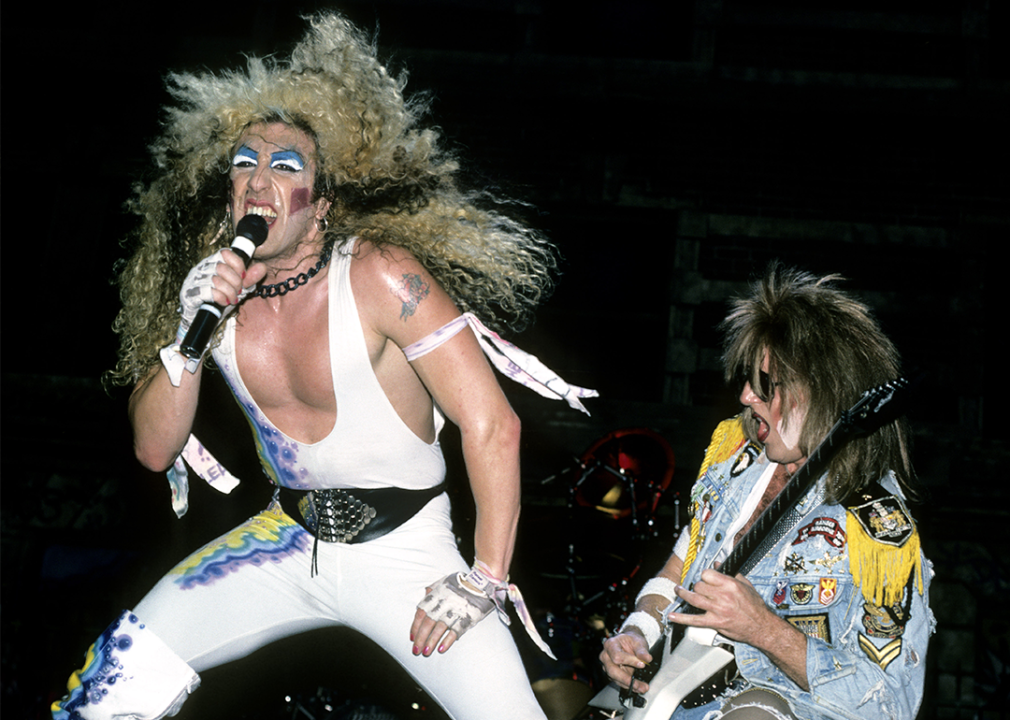
Larry Busacca/WireImage // Getty Images
Twisted Sister
Twisted Sister thrived during the heyday of ’80s hair metal and put out two popular songs during that time—”We’re Not Gonna Take It” and “I Wanna Rock,” both off their 1984 LP, “Stay Hungry”—so why are they on this list? Only the former went gold (and that didn’t happen until 2009). Despite technically being a one-hit wonder, singer Dee Snider does not think of his band that way.
“You’ll see words like ‘one hit wonder’—it’s actually two!” he said in an interview on “Oprah: Where Are They Now” in 2015. “‘Or flash in the pan’ or ‘lucky’ or things like that applied to our band, when that couldn’t be anything further from the truth.”
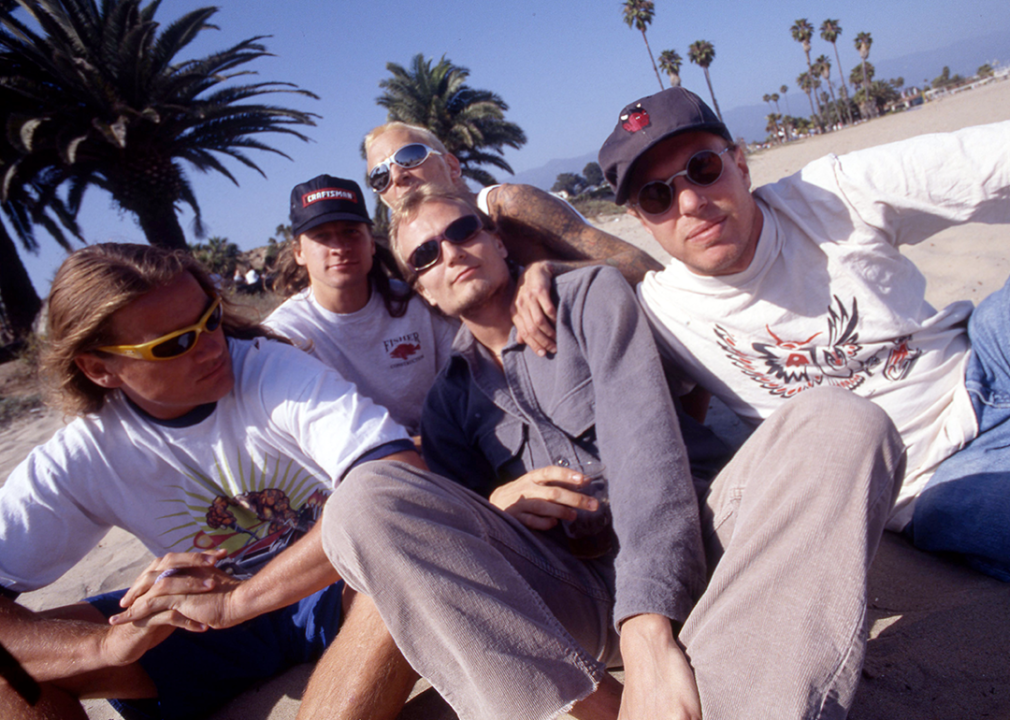
Martyn Goodacre // Getty Images
Ugly Kid Joe
Ugly Kid Joe is another act that some argue to be a two-hit wonder. The angsty ’90s band’s debut single “Everything About You” broke the top 10 on Billboard’s Hot 100 chart in 1992 thanks to a sync in “Wayne’s World,” but their cover of Harry Chapin’s 1974 classic “Cat’s in the Cradle” is Ugly Kid Joe’s only song to achieve gold status. After failing to produce another charting single, the band broke up in 1997 but reunited in 2010.

Ebet Roberts/Redferns // Getty Images
The Verve
Like its title, the story behind the Verve’s gold-certified hit “Bitter Sweet Symphony” is bittersweet. The famous violin riff that makes the 1997 Britpop classic instantly recognizable was sampled from Andrew Loog Oldham’s orchestral version of the Rolling Stones’ “The Last Time.” Long story short, the band was charged with plagiarism, and the legal aftermath saw Mick Jagger and Keith Richards receiving songwriting credits and the Stones’ former manager Allen Klein retaining all the song’s royalties. Oldham also sued the band for $1.7 million.
The Verve broke up in 1999; however, the story ended on a sweet note. When Klein passed away in 2009, the band’s frontman, Ashcroft, contacted Klein’s son about reopening negotiations. This time, Ashcroft won, and 100% of the song’s royalties were returned to him.
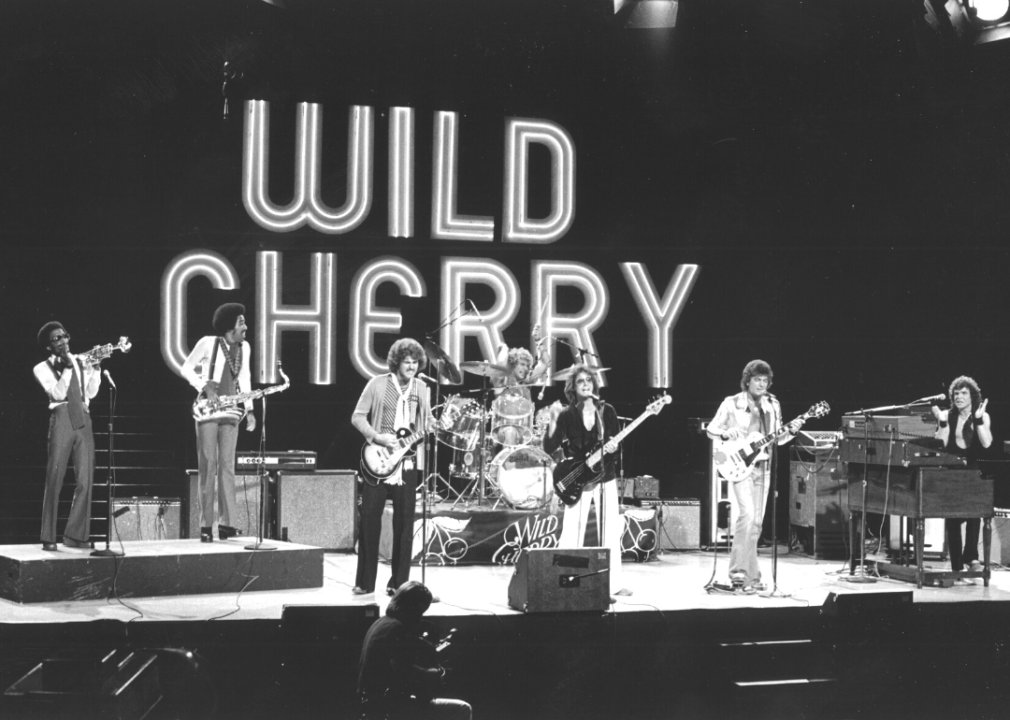
Michael Ochs Archives // Getty Images
Wild Cherry
It’s hard to believe that a band that released one of the most popular funk songs ever actually started as a hard rock act, but Wild Cherry spent their early days covering rock tunes. By the mid-’70s, funk and disco reigned supreme, and singer Rob Parissi thought they should follow suit (to the lament of the rest of the band).
During one of their sets, someone shouted, “Are you white boys going to play some funky music?” and “Play That Funky Music” was born. It topped the charts and went platinum in 1976, earning the band two Grammy nominations. Wild Cherry could not replicate the success of their funk megahit and broke up in 1979.
Story editing by Cynthia Rebolledo. Copy editing by Paris Close.
You may also like: 20 hit songs you may not know were written by music icons
